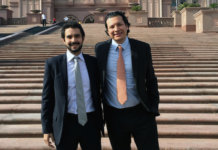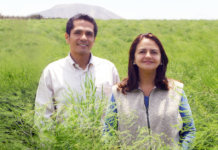Interview with Lucia Ceja, PhD, IESE Business School and Families in Business Analysis Center, Spain
Photograph by Daniel Santacatalina Laborda
The quest to discover the secret to happiness has been one which has preoccupied mankind since the dawn of recorded time. Aristotle and the ancient Greeks discussed happiness at length, and the American founding fathers included “the pursuit of happiness” as an inalienable right in the Constitution. Today, anyone has access to self-help books with various instructions for finding happiness, and yet, is mankind, in fact, happier than it was before?
One woman has made the topic of happiness and how it ties into family businesses the heart of her academic and consulting pursuits. Lucia Ceja, PhD is part of the Executive Coaching team and researcher at the Family-Owned Business Chair at the IESE Business School, she is also a happiness consultant for family-owned businesses at the Families in Business Analysis Center (FIBAC) in Barcelona, Spain.
Ceja’s current expertise involves Positive Leadership in family-owned businesses, the genesis and development of healthy psychological ownership, and the training of the next generation to become committed and happy owners in their family-owned businesses.
Tharawat Magazine met with Lucia to discuss the science of happiness.

You have an unusual job description. You specialise in cultivating happiness, specifically in a family business environment. How did you find yourself in this line of work?
I began studying Psychology about 17 years ago, and I discovered one day that one of my professors was offering a course in the study of happiness. At that time, I found Psychology had been biased towards focusing on all the negative issues. We knew a lot about mental disorders but very little about what makes us happy. So I started to get more and more interested in this emerging field of positive psychology, and it was fascinating. Then I began to think about how I could merge all of this positive psychology with family business. I’m a next generation member of a family business that my grandfather founded. From a very young age, I saw how our family business was helping the community by employing and empowering young people, for example, and realised that family-owned businesses can be important contributors to the sum of happiness in the world. I began to see a perfect match between the positive psychology I had been studying and the values that are at the foundation of family firms. So, that’s how I ended up working as a happiness consultant for family-owned companies.
What are the common factors that make people happy?
The conversation about happiness stretches as far back as the time of Aristotle who spoke about how people could lead happier lives. What has been happening over the last decade is that we are seeing more and more research on happiness. We have now more knowledge about what the key elements are to living a happy life. There is one model developed by Martin Seligman, one of the founding fathers of positive psychology, that has sound scientific foundations: The PERMA model suggests that there are key ingredients that we need in our lives to become happier.
The first one is positive emotions. This means experiencing positive emotions regularly in our daily lives. Secondly, we need to feel engaged. We need to have a personal project that makes us interact with life. Something that drives us and really makes us feel we’re doing something that makes us feel passionate. The third ingredient is the need for positive relationships. Not just superficial but deep and positive relationships. The fourth component is meaning. We need to feel that we’re adding something meaningful to the world. That we’re somehow helping the world to be a better place, and are adding value. And the last ingredient is the feeling of achievement that we’re evolving and achieving our goals. So, I think happiness is an integration of these five elements.

Do we have more reason today to be happy or unhappy than in any other time in history?
I think happiness is natural to us, as human beings. It’s our natural state of being, really. The challenge we’re facing at the moment is that we have too much information about happiness, so we need to filter out our sources of information and rely mainly on information that has some scientific foundation. Everyone is talking about happiness and it’s becoming quite an obsession. There are many sources that are not as scientific as others. We must ask ourselves who is behind this training program? Who is behind this research? Who is behind this book I’m reading? Because when we get the wrong information, we can get frustrated. I think the challenge is to find the right sources of information and training, and to find the tools that feel right to us.
Your family business has been a sort of framework for happiness. Do you believe that all family businesses can offer that?
We did research quite a few years back at the family-owned business chair at the IESE Business School, where we looked at the top hundred companies in the world-family owned and non-family owned, and we compared their values. We found that the value of generosity was prevalent in family-owned firms. This means being generous to clients, to employees, to the world. And we didn’t find it to the same extent in the non-family organisation. The values found in the family-owned businesses (generosity, humility, compassion) all shared a human component.
I believe that these values, linked with the long-term perspective and their sense of legacy that most family firms have, create workplaces that care about human well-being and happiness across time. I believe that family owned firms have all the power to make the world a happier place. However, many family businesses do not realise they have this power.

Does the industry affect the family business’ ability to provide a base for happiness?
I think it’s more about the mission, values and vision. I think we’re experiencing a generational change with millennials and I see it every day with my clients. It doesn’t matter to them that they may be selling a brick and there’s nothing glamorous about that. They’re thinking more about the impact of their product on the planet as a whole. And how this impact can be more positive in terms of the well-being of the planet, the well-being of the employees, and the well-being of people.
Different things make us happy at different times in our lives. How do we find out at every stage of our lives, what makes us happy?
Many times we don’t even know what makes us happy. We think that we know, but we’re just following the social norms or what is trendy. So first, we need to make sure we know our strengths. Because this is going to direct us to what makes us really passionate, what makes our lives meaningful. The more depressing experiences occur where we cannot use our strengths.
[ms-protect-content id=”4069,4129″]
There’s a very simple but powerful exercise: For one month, write down three things that you really enjoy every day. I call this a happiness diary. After a month you’re going to have a collection of situations, experiences, and people that make you happy. From this simple exercise, anyone can start building their own happiness project. Once we start developing a happiness project where we feel we’re growing and adding something meaningful to the world, it provides us with a source of inspiration and positive energy. It’s like we are retraining our brains to focus on the positive aspects of our lives and make them flourish.

But what do we do with negative people around us in the family business?
Family firms are a system. And when we’re part of a system, we are very powerful, as any positive change we make in ourselves will have an enormous impact in the whole system. One thing that is key in order to feel happy and to develop positive relationships in the family business is to appreciate not only our strengths but also the strengths of others. Look at the strengths you have in your family and recognise them. And when you start appreciating, validating those strengths, it really changes the dynamics of those relationships. It’s really impressive how one person can start changing the dynamic of a whole family. It’s going to take time and effort. But, when you start seeing slight changes, this means that you have started a positive movement that will continue growing and mitigating the negative dynamics. It’s a positive movement that will help you flourish.
So there’s a solution to the negative uncle or to the pessimistic cousin?
There is absolutely. One very important thing that can really add happiness to the family business is to ensure every person finds her or his unique role. Too often I see members of family businesses that are in positions that are not connected to their passions and their strengths and this can create feelings of resentment and frustration of not being able to express our true self. I think it is very important that all the members of family firm really ask themselves theses questions. Am I really adding value to the family firm? Am I really flourishing in this role? Is this role aligned with my life project? Am I nurturing my best self in this role? Am I being able to use my strengths to their full potential? There are many roles in the family business that you can play. You can be a responsible and happy owner. You can be involved in the management, or you can be involved in the family forums. You just need to find the role that really allows you to feel happy, gives you a sense of meaning, and it is aligned with your life project. This should be your happiness compass that helps you find your role in the family business and add to the happiness of others.
[/ms-protect-content]














